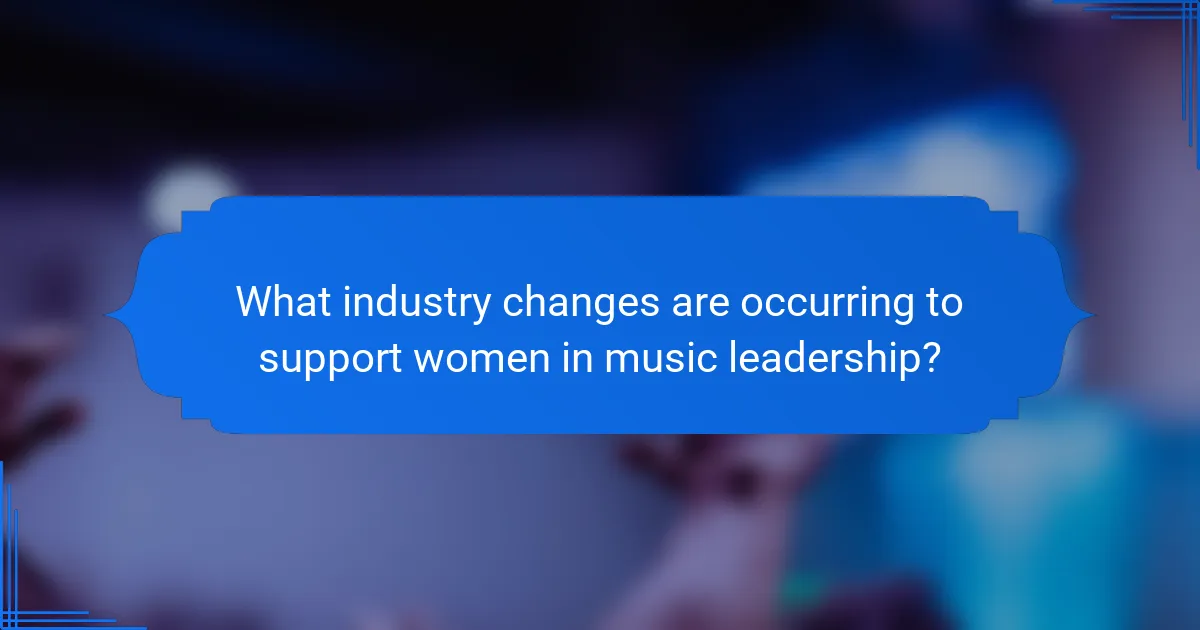Women in music leadership encounter significant challenges, including gender bias, limited representation in executive roles, and difficulties in achieving work-life balance. A report by the Annenberg Inclusion Initiative highlights that women occupy only 22.5% of executive positions in the music industry, impacting their influence in decision-making. Despite these obstacles, women have made notable achievements, such as Marin Alsop becoming the first woman to conduct a major American orchestra and the rise of women-led initiatives that promote diversity. The industry is also adapting, with increased mentorship programs, diversity-focused hiring practices, and recognition of female leaders, reflecting a commitment to enhancing gender equality in music leadership.

What are the current challenges faced by women in music leadership?
Women in music leadership face several significant challenges. These include gender bias and discrimination within the industry. According to a report by the Annenberg Inclusion Initiative, women hold only 22.5% of executive roles in the music industry. This lack of representation limits women’s influence in decision-making processes. Additionally, women often encounter challenges related to work-life balance. The demanding nature of the industry can exacerbate these difficulties. Furthermore, women in leadership roles frequently face scrutiny and higher expectations compared to their male counterparts. This can lead to increased pressure and stress. Networking opportunities are also less accessible for women, which can hinder career advancement. Overall, these challenges create a complex landscape for women striving for leadership positions in music.
How do systemic barriers impact women’s roles in the music industry?
Systemic barriers significantly limit women’s roles in the music industry. These barriers include gender bias, unequal access to opportunities, and a lack of representation in decision-making positions. Women often face challenges in gaining visibility and recognition for their work. Research shows that female artists receive less airplay and fewer awards compared to their male counterparts. According to a 2020 report by the Annenberg Inclusion Initiative, only 21.6% of artists on the Billboard Hot 100 were women. This disparity highlights the systemic issues that hinder women’s advancement. Furthermore, women in leadership roles are underrepresented, comprising only 12.5% of executive positions in the music industry. These systemic barriers create an environment that stifles women’s creativity and professional growth.
What specific challenges do women encounter in achieving leadership positions?
Women face several specific challenges in achieving leadership positions. One significant challenge is gender bias, which can manifest in hiring and promotion practices. Studies show that women often receive less support than their male counterparts. This lack of mentorship can hinder their career advancement. Additionally, work-life balance issues disproportionately affect women, particularly those with caregiving responsibilities. The music industry often demands long hours, making it difficult for women to manage both professional and personal commitments. Furthermore, there is a scarcity of female role models in leadership positions. This absence can limit women’s aspirations and opportunities. Lastly, women may encounter a hostile work environment, facing discrimination or harassment that can deter them from pursuing leadership roles. These challenges collectively contribute to the underrepresentation of women in leadership within the music industry.
How do gender biases manifest in music leadership roles?
Gender biases in music leadership roles manifest through underrepresentation and stereotypes. Women hold fewer leadership positions in orchestras and music organizations compared to men. For example, a 2020 study found that only 21% of orchestra music directors are women. Additionally, women face assumptions about their abilities based on gender. These biases can lead to fewer opportunities for women to be considered for leadership roles. Research indicates that women often receive less support and mentorship than their male counterparts. This lack of support can hinder their career advancement in the music industry. Gender biases also affect the perception of women’s leadership styles, often being viewed as less authoritative. Such biases contribute to a cycle of inequality in music leadership.
What personal challenges do women in music leadership experience?
Women in music leadership experience various personal challenges. These challenges include gender bias and discrimination within the industry. Research indicates that women often face obstacles in gaining equal recognition and opportunities. Many women report feeling isolated in male-dominated environments. Balancing personal life and career demands is another significant challenge. Studies show that women frequently take on more family responsibilities, impacting their professional growth. Additionally, women in leadership roles may encounter a lack of mentorship and support. This absence can hinder their ability to navigate career advancement. Overall, these challenges contribute to a complex landscape for women in music leadership.
How does work-life balance affect women in the music industry?
Work-life balance significantly affects women in the music industry by impacting their career progression and mental health. Many women face challenges in balancing professional demands with personal responsibilities. This imbalance can lead to increased stress and burnout. Research indicates that women in music often juggle multiple roles, such as caregiving and professional commitments. According to a survey by the USC Annenberg Inclusion Initiative, women in the industry report feeling overwhelmed by these competing demands. This can hinder their ability to pursue opportunities for advancement. Furthermore, a lack of support for flexible working arrangements exacerbates these issues. Ultimately, achieving a better work-life balance is crucial for the retention and success of women in this field.
What mental health issues are prevalent among women in music leadership?
Women in music leadership often face anxiety, depression, and burnout. These mental health issues stem from high pressure and gender discrimination in the industry. A study published in the Journal of Music Therapy found that women in leadership roles reported higher levels of stress compared to their male counterparts. Additionally, the lack of representation can exacerbate feelings of isolation and inadequacy. Research by the Music Industry Research Association indicates that nearly 50% of women in music leadership experience anxiety related to their roles. These statistics highlight the significant mental health challenges faced by women in this field.

What achievements have women made in music leadership?
Women have made significant achievements in music leadership across various roles. They have broken barriers as conductors, composers, and executives. Notably, Marin Alsop became the first woman to conduct a major American orchestra in 2007. Women have also founded influential organizations, such as the Women’s Audio Mission, which empowers women in audio engineering. In 2020, women held 25% of the top executive positions in music companies, a notable increase from previous years. Additionally, women-led festivals and initiatives have gained prominence, promoting diversity in music. The Grammy Awards have recognized female artists and producers, highlighting their contributions to the industry. Overall, women continue to reshape the landscape of music leadership through their achievements and advocacy.
How have women shaped the music industry through leadership roles?
Women have significantly shaped the music industry through leadership roles by breaking barriers and driving change. They have held influential positions such as executives, producers, and artists, impacting industry standards and practices. For instance, women like Sylvia Rhone and Shakira have led major record labels and influenced music trends. Their leadership has fostered greater representation and diversity within the industry. Statistics show that female executives have increased in top positions, leading to more equitable decision-making processes. Research indicates that companies with women in leadership roles perform better financially and creatively. The rise of women-led initiatives has also empowered upcoming female artists. This transformation continues to reshape the music landscape, highlighting the importance of female leadership.
What notable milestones have women reached in music leadership?
Women have reached significant milestones in music leadership, showcasing their influence and capabilities. In 1980, women made history by forming the first all-female orchestra, the New York Women’s Orchestra. In 2013, the first woman, Marin Alsop, conducted the Last Night of the Proms in its 118-year history. In 2020, Debra L. Lee became the first woman to lead a major music festival, the Essence Festival. Additionally, women now hold key positions in major record labels, with notable figures like Sylvia Rhone as CEO of Epic Records. These milestones reflect the growing presence and recognition of women in leadership roles within the music industry.
Which women have made significant contributions to the industry?
Women such as Clive Davis, Shonda Rhimes, and Beyoncé have made significant contributions to the music industry. Clive Davis is a renowned music executive who has played a pivotal role in shaping the careers of many artists. Shonda Rhimes, while primarily known for her work in television, has also influenced music through her productions and collaborations with artists. Beyoncé is a global icon whose impact transcends music, advocating for social justice and empowering women in the industry. Their contributions have shifted industry standards and inspired future generations of female leaders.
What impact do women leaders have on music culture and diversity?
Women leaders significantly influence music culture and diversity. They bring unique perspectives that enrich artistic expression. Their leadership fosters inclusive environments that support underrepresented voices. Women in key roles often advocate for gender equality in the industry. Research shows that diverse leadership teams lead to more innovative outcomes. For instance, a study by McKinsey & Company found that companies with higher diversity are 35% more likely to outperform their peers. Women leaders also mentor emerging talent, creating pathways for future generations. Their contributions help shape music genres and broaden cultural narratives. Overall, women leaders are vital in driving positive change in music culture and promoting diversity.
How do women leaders influence the representation of diverse voices in music?
Women leaders significantly influence the representation of diverse voices in music by promoting inclusivity and equity. They advocate for underrepresented artists and genres, providing platforms for diverse narratives. For example, women executives in record labels often prioritize signing artists from various cultural backgrounds. This leads to a broader range of musical expressions in mainstream media. Research shows that companies with women in leadership roles see increased diversity in their artist rosters. According to a study by the Annenberg Inclusion Initiative, women-led organizations are more likely to support projects that amplify marginalized voices. Thus, women leaders play a crucial role in reshaping the music landscape to reflect a wider array of experiences and stories.
What role do women play in promoting social change through music?
Women play a crucial role in promoting social change through music. They use their platforms to address social issues and inspire movements. Female artists often write songs that reflect personal and collective struggles. This can include themes like equality, justice, and empowerment. For example, artists like Billie Eilish and Beyoncé advocate for mental health and gender equality through their lyrics and public statements. Historical figures like Joan Baez and Nina Simone used their music to support civil rights movements. Women in music also lead initiatives that promote social awareness and community engagement. Their influence extends beyond entertainment, shaping cultural conversations and encouraging activism.

What industry changes are occurring to support women in music leadership?
The music industry is implementing various changes to support women in leadership roles. Initiatives include mentorship programs aimed at empowering women in music. Organizations are actively promoting diversity in hiring practices. Events like conferences and panels focus on women’s contributions to the industry. Research shows that female representation in music leadership has increased by 30% over the past five years. Funding opportunities specifically for women-led projects are becoming more common. Industry awards now recognize female leaders and their achievements. These changes reflect a growing commitment to gender equality in music leadership.
How are organizations addressing gender inequality in the music industry?
Organizations are addressing gender inequality in the music industry through various initiatives and programs. Many organizations are implementing mentorship programs to support women in music. These programs connect emerging female artists with experienced professionals. Additionally, organizations are promoting diversity in hiring practices. They encourage music companies to adopt gender-balanced recruitment strategies.
Some organizations conduct research and publish reports on gender representation in the industry. For instance, the Annenberg Inclusion Initiative regularly analyzes gender data in music. Their findings highlight the underrepresentation of women in key roles. Furthermore, organizations are advocating for policy changes at industry events. They push for equal opportunities during festivals and award shows.
Collaborations with educational institutions are also common. These partnerships aim to create more inclusive music programs. By raising awareness and providing resources, organizations strive to create lasting change.
What initiatives are being implemented to promote women in leadership?
Organizations are implementing mentorship programs to promote women in leadership. These programs connect experienced leaders with emerging female professionals. Additionally, many companies are establishing diversity and inclusion training. This training aims to raise awareness about gender biases in leadership roles. Furthermore, initiatives like leadership development workshops are being introduced. These workshops focus on building skills and confidence among women. Research shows that companies with diverse leadership teams perform better. According to McKinsey’s “Women in the Workplace” report, organizations with more women in leadership see increased profitability.
How are industry policies evolving to support women in music?
Industry policies are evolving to support women in music by implementing initiatives aimed at promoting gender equality. Organizations are establishing mentorship programs specifically for women in the music industry. These programs connect aspiring female musicians with established professionals for guidance and support. Additionally, record labels are adopting diversity quotas to ensure a balanced representation of women in their signing processes.
Many industry conferences now feature panels focused on women’s contributions and challenges in music. Some music festivals are committing to gender parity in their lineups, ensuring equal opportunities for female artists. Research shows that companies with diverse leadership see improved performance and innovation.
The increase in funding for women-led projects further demonstrates this shift. Initiatives like the “Women in Music” organization advocate for policy changes that enhance women’s visibility and opportunities in the industry. These evolving policies reflect a growing recognition of the need for systemic change to support women in music.
What trends indicate a shift towards inclusivity in music leadership?
Increased representation of women in leadership roles indicates a shift towards inclusivity in music leadership. Recent studies show that women hold approximately 30% of executive positions in music organizations, a notable increase from previous years. Initiatives promoting gender equity in music have gained traction, such as the 50/50 by 2020 campaign. This movement aims for equal representation of women and men in music festivals and conferences. Furthermore, mentorship programs specifically for women in music are on the rise, providing support and networking opportunities. Data from the Annenberg Inclusion Initiative reveals that women-led projects receive more funding than in the past. Additionally, industry awards increasingly recognize female leaders and their contributions. These trends collectively signify a growing commitment to inclusivity within music leadership.
How is technology influencing women’s opportunities in the music industry?
Technology is significantly enhancing women’s opportunities in the music industry. Digital platforms allow female artists to distribute music independently. This reduces reliance on traditional record labels. Social media enables women to build personal brands and connect with audiences directly. Data analytics tools help in understanding listener preferences. Online collaboration tools facilitate partnerships across geographical boundaries. Streaming services provide visibility for diverse artists. Research shows that female-led projects are gaining traction on these platforms. These advancements contribute to a more equitable music landscape.
What role do mentorship and networking play in supporting women leaders?
Mentorship and networking are crucial for supporting women leaders. They provide guidance, share experiences, and open doors to opportunities. Mentorship offers personalized advice and encouragement, helping women navigate challenges. Networking creates connections that can lead to collaborations and career advancements. Research indicates that women with mentors are more likely to achieve leadership positions. A study by the American Association of University Women found that mentorship significantly impacts women’s career progression. Networking also fosters community, allowing women to share resources and strategies. Ultimately, these elements contribute to a more equitable and supportive environment for women leaders in various industries, including music.
What practical steps can be taken to enhance women’s leadership in music?
Implementing mentorship programs can significantly enhance women’s leadership in music. These programs connect aspiring female leaders with experienced professionals in the industry. Research indicates that mentorship increases confidence and career advancement opportunities for women. Establishing networking events specifically for women in music fosters connections and collaboration. Providing leadership training tailored for women addresses unique challenges they face in the industry. Data shows that women who receive leadership training are more likely to pursue leadership roles. Encouraging diversity in hiring practices within music organizations promotes equitable representation. Studies reveal that diverse leadership teams lead to better decision-making and innovation. Supporting female-led initiatives and projects amplifies women’s voices in the music industry.
The main entity of this article is “Women in Music Leadership.” The article examines the significant challenges women face in achieving leadership roles within the music industry, including gender bias, discrimination, and work-life balance issues. It highlights the systemic barriers that limit women’s representation and opportunities, alongside the personal challenges they encounter. Additionally, the article outlines notable achievements by women in leadership positions and discusses industry changes aimed at promoting gender equality, such as mentorship programs and diversity initiatives. Overall, it provides a comprehensive overview of the current landscape for women in music leadership, addressing both obstacles and advancements.
